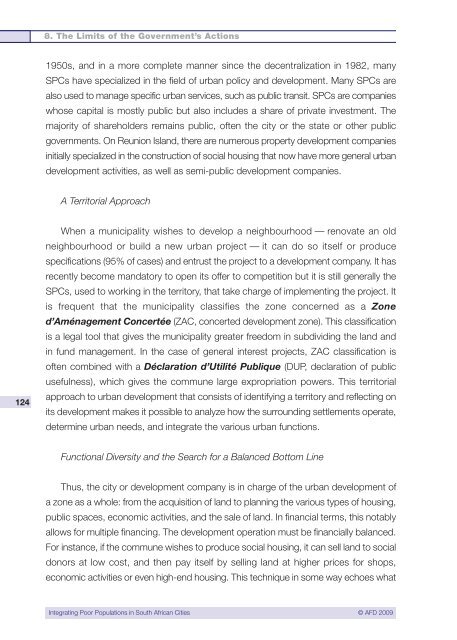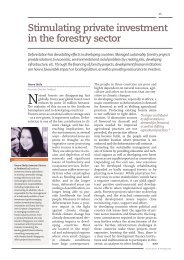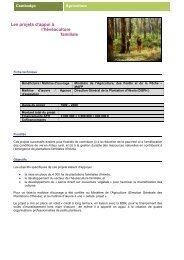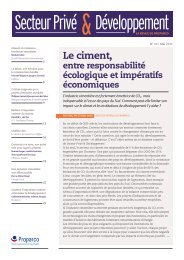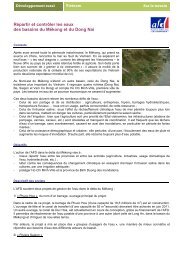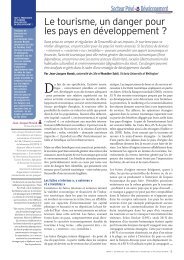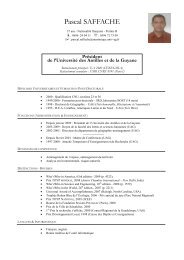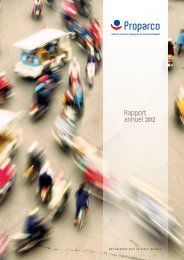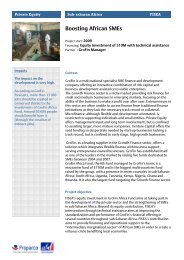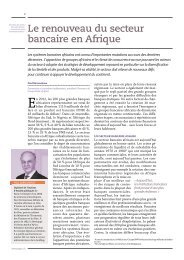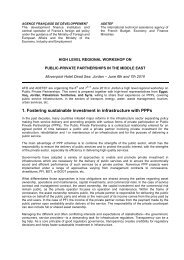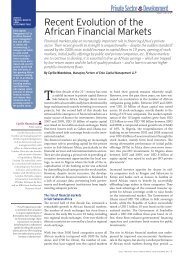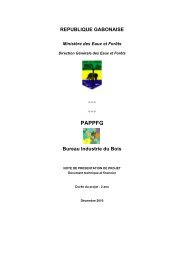Integrating Poor Populations in South African Cities - Agence ...
Integrating Poor Populations in South African Cities - Agence ...
Integrating Poor Populations in South African Cities - Agence ...
You also want an ePaper? Increase the reach of your titles
YUMPU automatically turns print PDFs into web optimized ePapers that Google loves.
8. The Limits of the Government’s Actions<br />
1950s, and <strong>in</strong> a more complete manner s<strong>in</strong>ce the decentralization <strong>in</strong> 1982, many<br />
SPCs have specialized <strong>in</strong> the field of urban policy and development. Many SPCs are<br />
also used to manage specific urban services, such as public transit. SPCs are companies<br />
whose capital is mostly public but also <strong>in</strong>cludes a share of private <strong>in</strong>vestment. The<br />
majority of shareholders rema<strong>in</strong>s public, often the city or the state or other public<br />
governments. On Reunion Island, there are numerous property development companies<br />
<strong>in</strong>itially specialized <strong>in</strong> the construction of social hous<strong>in</strong>g that now have more general urban<br />
development activities, as well as semi-public development companies.<br />
A Territorial Approach<br />
124<br />
When a municipality wishes to develop a neighbourhood — renovate an old<br />
neighbourhood or build a new urban project — it can do so itself or produce<br />
specifications (95% of cases) and entrust the project to a development company. It has<br />
recently become mandatory to open its offer to competition but it is still generally the<br />
SPCs, used to work<strong>in</strong>g <strong>in</strong> the territory, that take charge of implement<strong>in</strong>g the project. It<br />
is frequent that the municipality classifies the zone concerned as a Zone<br />
d’Aménagement Concertée (ZAC, concerted development zone). This classification<br />
is a legal tool that gives the municipality greater freedom <strong>in</strong> subdivid<strong>in</strong>g the land and<br />
<strong>in</strong> fund management. In the case of general <strong>in</strong>terest projects, ZAC classification is<br />
often comb<strong>in</strong>ed with a Déclaration d’Utilité Publique (DUP, declaration of public<br />
usefulness), which gives the commune large expropriation powers. This territorial<br />
approach to urban development that consists of identify<strong>in</strong>g a territory and reflect<strong>in</strong>g on<br />
its development makes it possible to analyze how the surround<strong>in</strong>g settlements operate,<br />
determ<strong>in</strong>e urban needs, and <strong>in</strong>tegrate the various urban functions.<br />
Functional Diversity and the Search for a Balanced Bottom L<strong>in</strong>e<br />
Thus, the city or development company is <strong>in</strong> charge of the urban development of<br />
a zone as a whole: from the acquisition of land to plann<strong>in</strong>g the various types of hous<strong>in</strong>g,<br />
public spaces, economic activities, and the sale of land. In f<strong>in</strong>ancial terms, this notably<br />
allows for multiple f<strong>in</strong>anc<strong>in</strong>g. The development operation must be f<strong>in</strong>ancially balanced.<br />
For <strong>in</strong>stance, if the commune wishes to produce social hous<strong>in</strong>g, it can sell land to social<br />
donors at low cost, and then pay itself by sell<strong>in</strong>g land at higher prices for shops,<br />
economic activities or even high-end hous<strong>in</strong>g. This technique <strong>in</strong> some way echoes what<br />
<strong>Integrat<strong>in</strong>g</strong> <strong>Poor</strong> <strong>Populations</strong> <strong>in</strong> <strong>South</strong> <strong>African</strong> <strong>Cities</strong> © AFD 2009


